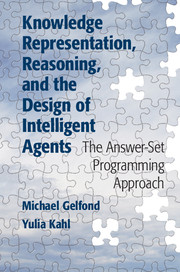 Knowledge Representation, Reasoning, and the Design of Intelligent Agents
Knowledge Representation, Reasoning, and the Design of Intelligent Agents Book contents
- Frontmatter
- Dedication
- Contents
- Preface
- 1 Logic-Based Approach to Agent Design
- 2 Answer Set Prolog (ASP)
- 3 Roots of Answer Set Prolog
- 4 Creating a Knowledge Base
- 5 Representing Defaults
- 6 The Answer-Set Programming Paradigm
- 7 Algorithms for Computing Answer Sets
- 8 Modeling Dynamic Domains
- 9 Planning Agents
- 10 Diagnostic Agents
- 11 Probabilistic Reasoning
- 12 The Prolog Programming Language
- Appendix A ASP Solver Quick-Start
- Appendix B Aspide
- Appendix C Introduction to SPARC
- Appendix D Code
- Bibliography
- Index
1 - Logic-Based Approach to Agent Design
Published online by Cambridge University Press: 05 July 2014
- Frontmatter
- Dedication
- Contents
- Preface
- 1 Logic-Based Approach to Agent Design
- 2 Answer Set Prolog (ASP)
- 3 Roots of Answer Set Prolog
- 4 Creating a Knowledge Base
- 5 Representing Defaults
- 6 The Answer-Set Programming Paradigm
- 7 Algorithms for Computing Answer Sets
- 8 Modeling Dynamic Domains
- 9 Planning Agents
- 10 Diagnostic Agents
- 11 Probabilistic Reasoning
- 12 The Prolog Programming Language
- Appendix A ASP Solver Quick-Start
- Appendix B Aspide
- Appendix C Introduction to SPARC
- Appendix D Code
- Bibliography
- Index
Summary
The goal of artificial intelligence is to learn how to build software components of intelligent agents capable of reasoning and acting in a changing environment. To exhibit intelligent behavior, an agent should have a mathematical model of its environment and its own capabilities and goals, as well as algorithms for achieving these goals. Our aim is to discover such models and algorithms and to learn how to use them to build practical intelligent systems. Why is this effort important? There are philosophical, scientiic, and practical reasons. Scientists are getting closer to understanding ancient enigmas such as the origins and the physical and chemical structure of the universe, and the basic laws of development of living organisms, but still know comparatively little about the enigma of thinking. Now, however, we have the computer — a new tool that gives us the ability to test our theories of thought by designing intelligent software agents. In the short time that this tool has been applied to the study of reasoning, it has yielded a greater understanding of cognitive processes and continues to produce new insights on a regular basis, giving us much hope for the future. On the software engineering front, mathematical models of intelligent agents and the corresponding reasoning algorithms help develop the paradigm of declarative programming, which may lead to a simpler and more reliable programming methodology. And, of course, knowledge-intensive software systems, including decision support systems, intelligent search engines, and robots, are of great practical value.
- Type
- Chapter
- Information
- Knowledge Representation, Reasoning, and the Design of Intelligent AgentsThe Answer-Set Programming Approach, pp. 1 - 10Publisher: Cambridge University PressPrint publication year: 2014


